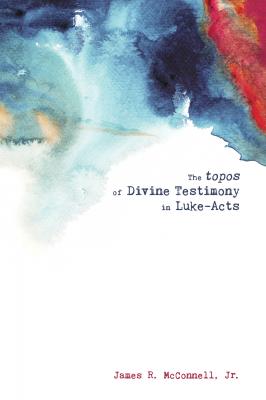The topos of Divine Testimony in Luke-Acts. James R. McConnell
Читать онлайн.| Название | The topos of Divine Testimony in Luke-Acts |
|---|---|
| Автор произведения | James R. McConnell |
| Жанр | Религия: прочее |
| Серия | |
| Издательство | Религия: прочее |
| Год выпуска | 0 |
| isbn | 9781630873639 |
The third chapter will examine how an ancient audience would have understood divine testimony through utterances by examining passages in Jewish and Greco-Roman histories and biographies, as well as early, non-canonical Christian writings roughly contemporary with Luke-Acts. In these sources, direct speech by the gods, divine speech through an inspired intermediary, and the use of oracles will be analyzed; from this analysis the function within the narratives of this type of divine testimony will be explicated. The expected result of this analysis is that divine speech is often used as testimony, either in favor of or against a person or an event. These results will then be used as a baseline and compared to the accounts of divine speech in Luke-Acts, which are examined in chapter four. As in chapter three, direct speech by God, speech through inspired intermediaries (those “filled with the Spirit”), and written utterances by God will be examined. A significant facet of the argument in this chapter is the equation, from an ancient audience’s perspective, of the use of oracles in Hellenistic narratives and references to Hebrew scriptures in Luke-Acts. The chapter will ultimately demonstrate that an ancient audience would have heard the topos of divine testimony through utterances in Luke-Acts in the same way as in extra-biblical narratives of the same period.
The next two chapters parallel the previous two; here, however, the focus will be on the topos of divine testimony through deeds, rather than speech. The structure of the investigations will follow Cicero’s description of what constitutes divine testimony through deeds (Top. 20.76–77). This description will also control which specific accounts in Luke-Acts constitute divine testimony through deeds. Therefore, not all instances of the miraculous will be considered; only those elements within the narrative that fall under Cicero’s categories will be examined. The goal of these chapters is, as in chapters two and three, to demonstrate that the topos of divine testimony through deeds would have been understood by an ancient audience to function in ways similar to those seen in Hellenistic narratives and biographies.
1. English citations from the Bible are from the NRSV, unless otherwise noted.
2. Danker notes, “Of the four evangelists, Luke makes most frequent use of the word-deed theme” (see Danker, Benefactor, 340).
3. These are described by Cicero as sources of divine testimony; see Top. 20.76–77.
4. Exceptions, of course, do exist. These will be noted in the following summary of the history of research.
5. See, e.g., Betz, Galatians, 32, 221, in which he maintains that Paul, especially in Gal 4, builds his argument around a “string of friendship topoi.”
6. Porter, “Scripture Justifies Mission,” 104–26.
7. Schubert, “The Structure and Significance of Luke 24,” 165–86.
8. See Schubert, “The Structure and Significance of Luke 24,” 173–74n20, in which he cites Cadbury, The Making of Luke-Acts, 302–5.
9. Schubert, “The Structure and Significance of Luke 24,” 176.
10. Bock, Proclamation.
11. Bock argues that Jesus is characterized as “more than a messiah” from this point on in the narrative; see Proclamation, 264.
12. Talbert, “Promise and Fulfillment,” 91–103.
13. Talbert begins his survey with Schubert, and then reviews the work of Schubert’s fellow Yale scholars N. Dahl, L. Johnson, and R. Karris.
14. It should be noted that Talbert agrees that proof from prophecy theology is a part of Luke-Acts. His argument is that proof from prophecy theology should not be considered the central theme around which Luke-Acts has been composed.
15. Rese, Alttestamentliche Motive.
16. Other uses of the OT include: a hermeneutical application in which the OT is used to show that current events are much like those narrated in the OT; a typological use through which the OT can assist in the understanding of current events; and finally an ethical use through which characters in Luke-Acts are portrayed as fulfilling the ethical demands of the OT. See Talbert, “Promise and Fulfillment,” 93–94.
17. Talbert notes that not all instances of proof from prophecy are in support of Luke’s conception of salvation history. He lists three other applications, including divine protection, encouragement of believers, and paraenesis; see “Promise and Fulfillment,” 95–96.
18. Talbert, “Promise and Fulfillment,” 96–101. For Bock’s response to Talbert’s critique, see Bock, “Proclamation,” 280–82.
19. Stanley, “Rhetoric,” 44–58.
20. Stamps, “Use of the Old Testament,” 9–37.
21. Morgenthaler, Lukas und Quintilian, esp. 364–85.
22. In this regard see also Neagoe, The Trial of the Gospel.
23. I am intentionally avoiding the term “supernatural,” as this carries with it a post-Enlightenment assumption that the world is governed by natural laws; this is clearly an anachronism when one considers the worldview of a first-century audience. Hume defined a miracle as “a transgression of a law of nature by a particular volition of the Deity, or by the interposition of some invisible agent” (Enquiries Concerning Human Understanding, 115 n. 1). This is the definition used by Swinburne, Concept of Miracle, 11 (“a violation of a law of nature by a god”). Swinburne makes a similar point to the one above concerning the supernatural
